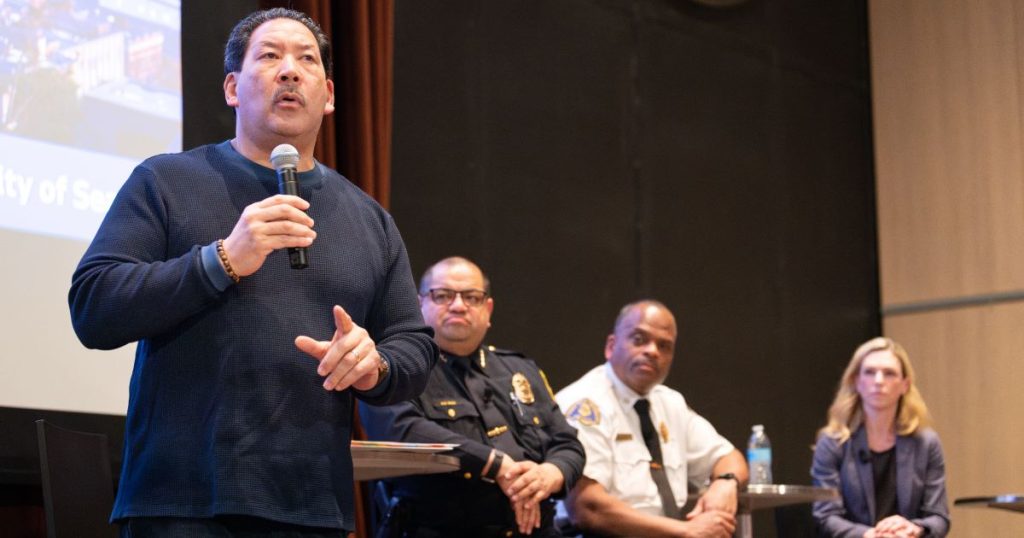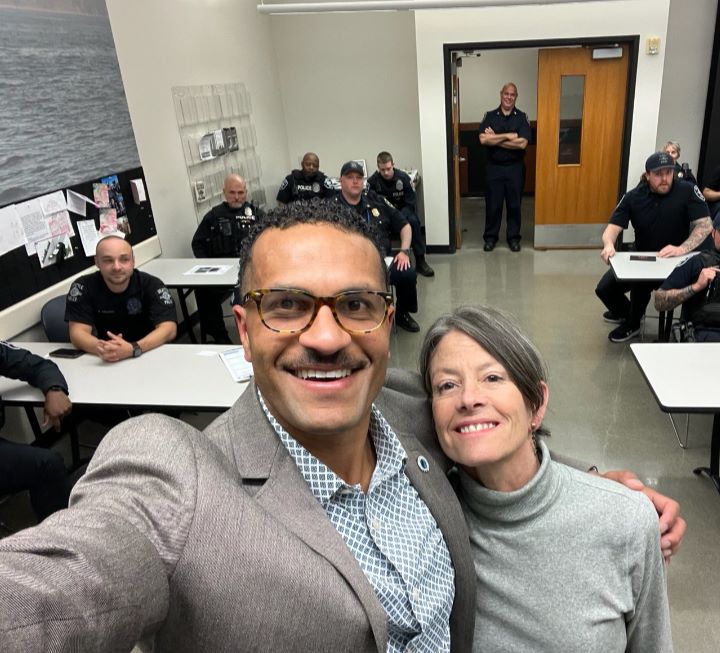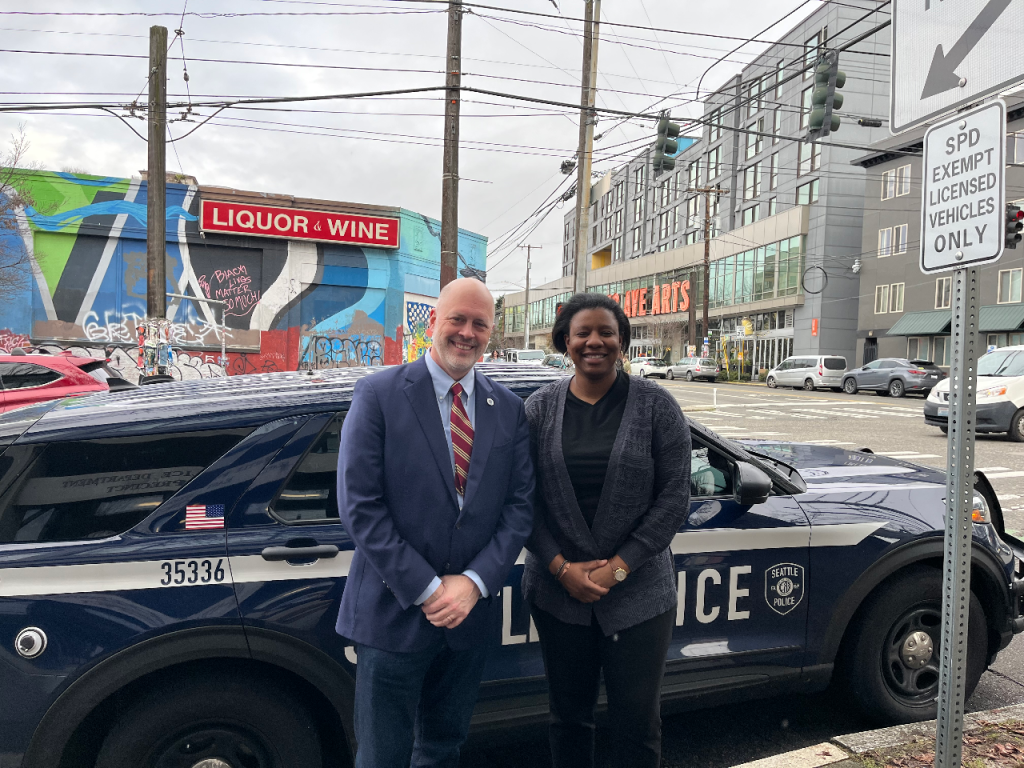
City leaders are weighing laxer hiring standards rather than improving SPD culture and accountability systems.
For the new Seattle city councilmembers to make good on their campaign promises, they need to be seen to be actively addressing public safety in Seattle. Earlier this week Mayor Bruce Harrell submitted the legislation for councilmembers to approve a new contract with the Seattle Police Officers Guild (SPOG), giving police officers a cumulative 23% raise and improving their benefits while not substantially improving accountability. Councilmembers are busy holding public safety forums stating their support for legislation to recriminalize “prostitution loitering” and considering calling the National Guard into Seattle’s streets. And the Public Safety committee has been discussing incentives for officers ranging from subsidized housing to take home cars.
Against this backdrop, Council President Sara Nelson has been holding discussions in her Governance, Accountability, and Economic Development committee about a new police recruitment bill. This bill, scheduled to be voted on in committee on May 9th, would add a new position related to police recruitment, move a few staff members from the Seattle Department of Human Resources (SDHR) to the Seattle Police Department (SPD), and “encourage” the Public Safety Civil Service Commision (PSCSC) to either switch police officer candidate entrance exam providers from the National Testing Network (NTN) to the Public Safety Test (PST) or allow the use of both.
Why the desired switch in tests? The NTN test has a pass rate that generally falls between 69-73%, while the PST test has a 90% pass rate. In addition, most of the Puget Sound region’s law enforcement agencies use the PST test, and councilmembers worry that having to take a different test could act as a barrier that dissuades some candidates from applying.
“What this legislation will not do is compromise our commitment to constitutional policing or lower our standards for what we want in the officers that serve our community,” Nelson said.
However, it seems possible the legislation in discussion might have exactly that effect.
Andrea Scheele, the executive director of the PSCSC, does not agree that the current entrance test is acting as a recruitment barrier. At a meeting of the Community Police Commission (CPC) last month, where she appeared following a presentation of the new legislation by Nelson, she repeatedly corrected Nelson’s facts. She said Seattle has been using NTN’s test since 2012.
”Personally I don’t believe the problem is that people can’t find us or people don’t want to take our test or people don’t know Seattle Police Department is hiring,” Scheele said. She pointed out that using a different test wasn’t an issue back in 2019 when SPD had plenty of applicants, and that applicants are finding out about the test and applying in similar ways now.
CPC Commissioner Joel Merkel agreed, saying, “There was a time where we had hundreds of applicants for just a handful of jobs in SPD using the same test we’re using right now, which makes me think there are a lot of other issues at play as well.”
“We want to get more qualified officers on the force, but we don’t want to throw away the baby with the bathwater,” Scheele said. “Not everyone can or should be a police officer. They need to be qualified.”

SPD Officer Mullens, who serves on the CPC, said he was seeing a lot of trainee police officers at SPD wash out. “They’re not passing the muster in terms of officer safety, officer presence, and things of that nature,” he said at the recent meeting.
Later in the same meeting, he added, “In some ways we’re not meeting the physical aspects of the job, which I know we don’t like to talk about it, but it comes into play.”
His complaints also seem to suggest the exam is not the primary issue with finding qualified officers, as there is a separate physical agility test prospective officers are required to take.
Councilmember Tammy Morales doesn’t agree with changing the test either. “The reason Seattle uses that [NTN] test is because we’ve been under consent decree for 12 years. And we’ve been under consent decree because of the biased policing in our force… use of force, unconstitutional policing, and so there’s a very valid reason why we’re using a different test, because we do have higher standards,” she said in a recent interview with Seattle Channel’s Brian Callahan. “I don’t believe that using a test that is easier to pass and doesn’t screen that out is an appropriate step.”
More cops at what cost?
The Council is discussing switching these tests, which would potentially lower officer standards, just as news dropped of a tragic past lapse in SPD’s hiring standards.
In early 2023, Officer Kevin Dave was driving 74 mph to answer a call when he struck and killed student Jaahnavi Kandula. PubliCola recently broke the news that SPD was aware while Dave was still an officer in training that he had a “checkered history” at the Tucson Police Department. While serving in Tucson for 18 months, Dave was the subject of six investigations, including a “preventable” collision and violating the department’s standards of conduct, the latter for which he was eventually let go.
After his firing, the Tucson Police Department recorded an incident when Dave allegedly engaged in drunk driving. This was also something about which SPD was aware when they chose to hire Dave, giving him a $7,500 lateral hire bonus since he’d been a police officer in the past.
In the recent CPC meeting, Commissioner Lynne Wilson asked Nelson about how her officer recruitment legislation impacted lateral hires, referencing Dave’s history with Tucson. “Is anybody addressing that [lateral hire] process?” she asked. “Because it seems like there are some pretty serious issues that were raised in his particular hire. We knew his background.”

Scheele clarified that the personal and professional history of a potential recruit is handled by SPD as part of the backgrounding process. “I agree with you,” she said. “It does bear scrutiny.”
Nelson said she didn’t know what screening was given to Dave nor what the standard practices are at SPD, but she also agreed the issue bears looking into. However, whether follow up will actually occur and the City will practice that oversight function on a routine basis is an open question.
This issue is only worsened by SPD’s recent trouble hiring laterals. They planned to hire 30 lateral officers in 2023, but as of a budget meeting in mid-October, they had only managed to hire six. Chief Adrian Diaz said there had been 127 lateral applicants thus far in the year, but they hadn’t met SPD’s standards. Nevertheless he seemed optimistic the department could hire 30 lateral officers in 2024, although he gave no concrete reasons why he expected this change.
Police watchdog group DivestSPD later published information on two of SPD’s hires from 2023, both of whom had been fired from previous law enforcement positions for failing field training. Jose Mena worked for the Federal Way Police Department, and his separation notice stated he “was having some problems in the FTO [Field Training Officer] program.” Aaron Hardy left the King County Sheriff’s Office in 2015. The main issues cited on his separation notice were his “performance in officer safety, emotional intelligence, and leadership.”
Both Mena and Hardy now work for SPD.
A problem of culture
Less discussed amongst councilmembers is how SPD’s culture might be exacerbating hiring problems and the headwinds felt around the country.
Issues with SPD’s culture have been well-documented, including the city of Seattle being held in contempt of court because of SPD’s repeated misuse of crowd control weapons in 2020, SPD having the largest contingent of officers of any law enforcement agency attending the January 6, 2021 rally in Washington DC, sickouts, the mock tombstone in the SPD break room, and much more.
In addition, four women SPD officers just filed a tort claim alleging sexual discrimination and harassment by Diaz and other department leaders. This is the third such claim in the last six months, following lawsuits from Officer Denise “Cookie” Boudin in November and Officer Deanna Nollette in January.
And even though these issues have been known since the 30×30 report was completed back in September, it took Mayor Bruce Harrell more than six months to hire an outside investigator to look into these gender discrimination and sexual harassment claims, a move the lawyer representing the four women in the most recent claim called “damage control” in the Seattle Times.

Morales addressed SPD’s gender discrimination and hiring challenges In her interview with Callahan: “Here in Seattle in particular…we’re having a hard time in part because of the culture of the department itself. We have lots of women in particular who have sued the department for discrimination and harassment. And when 50% of the population doesn’t feel like they’re welcome in a department it makes it hard to contemplate how you start to address those recruitment strategies. So I think there are some process issues that could be addressed, but I also think there are some cultural and departmental management issues that need to be addressed so that people are more interested in coming to the department.”
SPD is currently dealing with a myriad of difficulties, including culture issues, accusations of sexual harassment and discrimination, and overly lax backgrounding. Meanwhile, SPOG retains its stranglehold on mental health crisis calls that many cities are responding to with specially trained civilians, and the new SPOG contract soon to be voted on by City Council doesn’t meet the bare minimums of accountability stipulated in the Accountability Ordinance of 2017.
And yet instead of discussing these very real problems, all of which impact recruitment and deserve a closer look, the City Council is talking about a minor re-organization and the possibility of switching to an entrance exam that’s easier to pass. While many of these councilmembers are eager to distinguish themselves from their predecessors, abandoning their important oversight function in favor of coddling a troubled police force is not a responsible way of doing so.
Amy Sundberg is the publisher of Notes from the Emerald City, a weekly newsletter on Seattle politics and policy with a particular focus on public safety, police accountability, and the criminal legal system. She also writes science fiction, fantasy, and horror novels. She is particularly fond of Seattle’s parks, where she can often be found walking her little dog.


